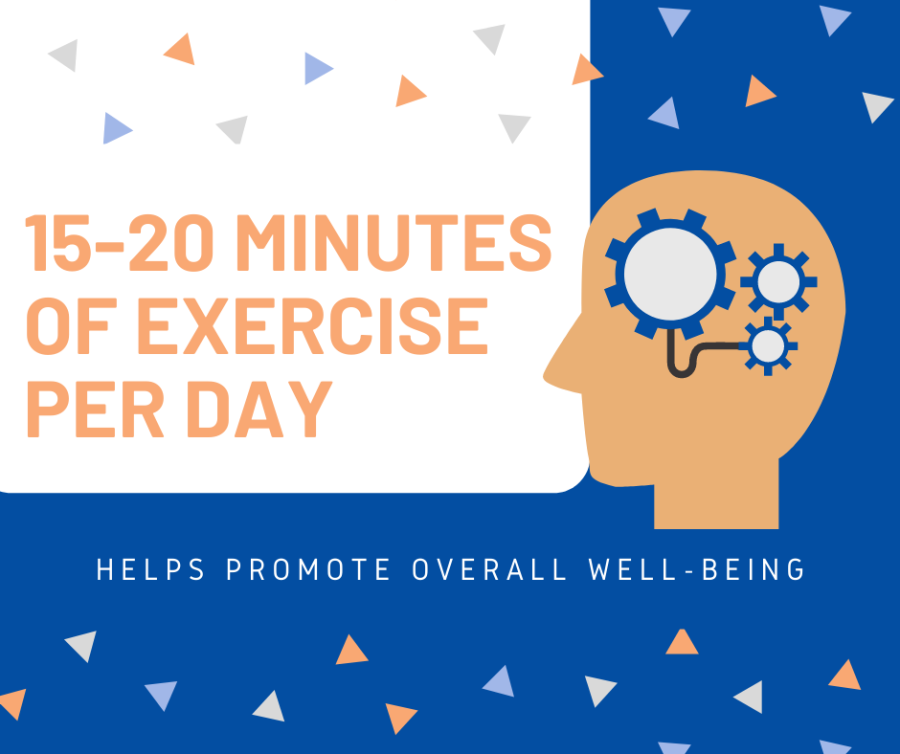How exercise can benefit mental health
Fitness and exercise may be a way to build muscle, lose some weight, increase metabolism and improve your overall physique, but one thing that can motivate many people to stay active is the sense of overall well-being and improvement in mental health.
Not everyone has to be extremely into fitness to feel the benefits of being active on a regular basis. Benefits of regular exercise include improved mental well-being, better sleep, improved memory, more energy and sharper thinking.
“I got into fitness well over five years ago; originally it was because of sports and to just get stronger overall. After a few months of being consistent I realized it really helped the overall well-being of my life,” said Konner Johnson, a certified personal trainer.
According to mentalhealth.org, physical activity has a huge potential to enhance our well-being. Some general mental health benefits of being regularly active include increased confidence, higher self-esteem, cleared mind fog and decrease in stress.
“The way I started to feel mentally after staying consistent with being active was what got me hooked,” Johnson said. “I was a nicer person and felt a major decrease in stress.”
The major change in Johnson’s overall well-being was what inspired him to become a personal trainer. He said he now uses fitness and exercise to help and motivate others.
“If exercise can help one person physically or mentally the way that it has helped me, then that is all that I can ask for. I really just want everyone to see how even being a little bit active each day can really make an impact on your life,” Johnson said.
One major impact exercise can have on people’s mental health is that it can give social support. Some people struggle with finding like-minded people and need an area of their life where they can connect with others on a deeper level.
There are many group fitness classes, gyms and even organizations that promote overall well-being and mental health while also exercising. A group on Kent State’s campus that does this is CHAARG.
The group is an on-campus health and fitness community that provides workouts, socials and other opportunities for members to get together and form a community. The group has specific days where they get together and focus on issues related to mental health.
“Originally, I joined CHAARG for the workouts, but the community is what kept me coming back. Being around these like-minded people allowed me to grow as a person and really shaped the way I view things,” said Marjorie Sovacool, a senior sociology major at Kent State and CHAARG member. “My mental health definitely improved as a result of being active and the community CHAARG has created.”
Regular exercise has also been used to treat actual mental health disorders. Psychologists use physical activity to treat things such as depression, anxiety, stress, ADHD and other psychological disorders.
“Exercise is very effective in treating depression and anxiety. It basically can act as an antidepressant to certain people battling with these types of mental health issues,” said Joel Hughes, professor and director of clinical training at Kent State.
When exercising, cognitive function in the brain is increased. There is an increase in oxygen saturation in the brain and neurotransmitters such as serotonin and norepinephrine rise. Stress hormones also drop, causing people to feel good during a workout.
Hughes specializes in cardiovascular behavioral medicine and has been at Kent State since 2003. To some people physical activity can be an extremely effective form of treatment and Hughes said he often recommends some form of physical activity to those dealing with stress, anxiety and depression.
“Some form of aerobic exercise is recommended because it gets the heart rate up, but ultimately any type of physical activity can help,” Hughes said. “We really just want to make sure the person feels good. If they are happy doing it, it will create a habit that can help battle their anxiety or depression overall.
Many people, when first starting a fitness journey, only really think about the physical benefits. The mental benefits tend to last longer than the physical ones and also make a bigger impact on the person’s life overall, Hughes said.
Even 15-20 minutes of physical activity a couple days a week can really make an impact on a person’s mental health. An individual does not need to be diagnosed with a mental health disorder to use fitness as a way to improve mental health, Hughes said.
“Fitness has been a part of my life for a few years now. I started working out just for fun, but now it is something in my daily routine that I look forward to and use as a form of stress relief,” said Talia Diaz, a junior studying speech language pathology. “Before exercise was a main part of my life, I would often feel foggy and out of it, but now my mental health is a lot more stable and I also have a lot more confidence in myself.”
Kenzie Johnston covers health and fitness. Contact her at [email protected].



